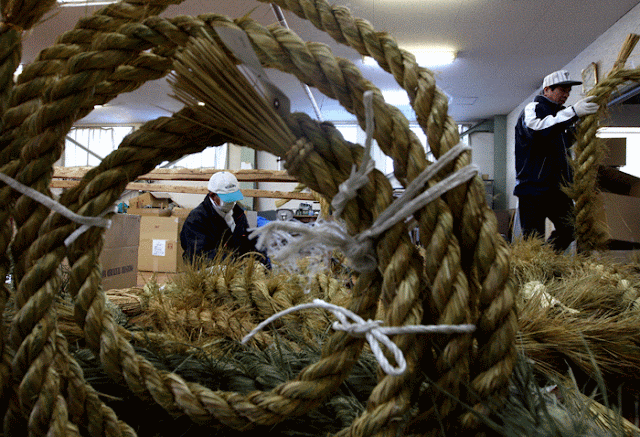 |
| A woman sees the fresh crabs live in sea water tank during a Echizen Crab Festival at Sunset Beach in Mikuni, Fukui prefecture, about 320 kilometers northwest Tokyo, Japan November 14, 2010. Pic- Buddhika Weerasinghe/Street Photo Gallery.844Y6482 |
Buy Pictures © Buddhika Weerasinghe |
A small girl taste soup ball of Miso Crab during a Echizen Crab Festival
at Sunset Beach in Mikuni, Fukui prefecture about 320 kilometers
northwest Tokyo, Japan November14, 2010. Pic- Buddhika Weerasinghe.
/Street Photo Gallery. 844Y6362 |
Five years ago I started to eat Echizen crabs because my wife so much likes to eat crabs. Early I hate to eaten the crab because that crabs is so difficult task for me to ate. Now I like too, eat to Echizen crabs that taste is so much good said Yamazaki Masake 31 years old man in Mikuni city, who was married five years ago.
Yamazaki is come with his wife and newly born baby for enjoy the taste and buy the Echizen crabs in annual crab’s festival.
 |
Fresh crabs live in sea water tank during a Echizen Crab Festival at
Sunset Beach in Mikuni, Fukui prefecture about 320 kilometers north
west Tokyo, Japan November14, 2010. Pic- Buddhika Weerasinghe/Street
Photo Gallery. 844Y6362 |
 |
Men take out boil crabs from boiler during a Echizen Crab Festival at
Sunset Beach in Mikuni, Fukui prefecture about 320 kilometers north
west Tokyo, Japan November14, 2010. Pic- Buddhika Weerasinghe/Street
Photo Gallery. 844Y6494 |
Echizen Crab Festival is one of biggest seafood event in Hokuriku region that event held on November 13 Saturday and 14 Sunday at Mikuni Sunse
t Beach one week after start to catching the crabs in this year. That festival starts 15 years ago in 1995. That is like a two day celebration and promotion of Echizen crabs. Although, ordinary people should buy Echizen crabs 10% to 20% special discount and taste the crab hot pot. Miso Crab soup is most famous more than bake and boils crab hot pot that is \300.
Thousands of people come to enjoy the taste and buy to Echizen crab some less price during a two days crab festival.
Yamazaki is worried about crab prize and said “Echizen crabs is too much expensive because that brand name”.
On the other hand crabs catching fishermen worried about this year crabs price is less. Japan’s economic and financial crisis has effected for this year crab price too. Mikuni Fishing Corporation official said, large size of
 |
A woman vends the crabs during a Echizen Crab Festival at Sunset
Beach in Mikuni, Fukui prefecture about 320 kilometers northwest
Tokyo, Japan November14, 2010. Pic- Buddhika Weerasinghe/Street
Photo Gallery. 844Y6426 |
Echizen crab (snow crab) that weight 1.6 kilogram sold Yen |55,000(USD 676.71) highest price in the last year but that same size Echizen Crab this year sell Yen 33,400(USD 410.94) during the first day, November 6 Echizen crab auction at fishing market in Mikuni city, Fukui prefecture.
Fishermen and crab selling person hope crab price will be going up with next few days.
 |
People buy the crabs during a Echizen Crab Festival at Sunset Beach in
Mikuni, Fukui prefecture about 320 kilometers northwest Tokyo, Japan
November14,2010.Pic- Buddhika Weerasinghe/Street Photo Gallery. 844Y6229 |
Mikunionsen Bouyouru is one of biggest crabs catching company and their run newly open crab restaurant. That company managing director Shoichi Mori, 46 years old said “different people living in the world. Crabs also like that. Inside the quality of Echizen crab has some different comparing to other crabs. These crabs are so fresh and living in good condition of environment ocean around the Mikuni port, Sea of Japan.
Echizen crab is one of most expensive crab in Japan. That crab trade mark is yellow tag which tag even boiling time and serving time can see big size right hand.
 |
| A small girl taste soup ball of Miso Crab during a Echizen Crab Festival at Sunset Beach in Mikuni, Fukui prefecture, about 320 kilometers northwest Tokyo, Japan November 14, 2010. Pic- Buddhika Weerasinghe/Street Photo Gallery.844Y6374 |
 |
| A man sees crabs at stall during a Echizen Crab Festival at Sunset Beach in Mikuni, Fukui prefecture, about 320 kilometers northwest Tokyo, Japan November 14, 2010. Pic- Buddhika Weerasinghe/Street Photo Gallery.844Y6416 |
© Buddhika Weerasinghe































































